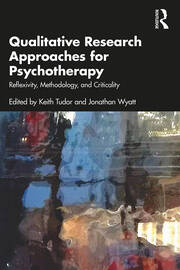1st Edition
Qualitative Research Approaches for Psychotherapy Reflexivity, Methodology, and Criticality
Qualitative Research Approaches for Psychotherapy offers the reader a range of current qualitative research approaches congruent with the values and practices of psychotherapy itself: experience-based, reflective, contextualized, and critical.
This volume contains 14 compelling, challenging new essays from authors in both the Northern and Southern hemispheres, writing from a range of theoretical and cultural perspectives. The book covers both established and emerging approaches to qualitative research in this field, beginning with case study, ending with postqualitative, and with hermeneutic, reflexive, psychosocial, Talanoa, queer, feminist, critical race theory, heuristic, grounded theory, authoethnographic, poetic and collaborative writing approaches in between. These chapters introduce and explore the complexity of the specific research approach, its assumptions, challenges, ethics, and potentials, including examples from the authors’ own research, therapeutic practice, and life. The book is not a ‘how to’ guide to methods but, rather, a stimulus for psychotherapy researchers to think and feel their way differently into their research endeavours.
This book will be an invaluable resource to postgraduate students, practitioners and established researchers in psychotherapy who are undertaking (or considering) qualitative research for their projects. It will also appeal to course tutors and trainers looking for a volume around which to structure a qualitative research methods course.
Introduction
Keith Tudor and Jonathan Wyatt
1. Into the Thick of It: Troubling Case Studies and Researching Close to Therapeutic Practice
Liz Bondi
2. Hermeneutic Phenomenology: Exploring and Making Meaning of Lived Experience in Psychotherapy Research
Kerry Thomas-Anttila and Margot Solomon
3. Using Performative Meta-Reflexivity in Psychotherapy Research
Jacqueline Karen Andrea Serra Undurraga
4. A Psychosocial Coming into Play: Researching Authenticity in Therapy, The Academy, and Friendship
Nini Fang, Anne Pirrie and Peter Redman
5. Feminist Research in Psychotherapy: The Strange Case of The United Kingdom’s ‘Hostile Environment’ Policy
Emily le Couteur
6. Critical Race Theory: A Methodology for Research in Psychotherapy
Divine Charura and Sonya Clyburn
7. Pasifika Research Methodologies and Psychotherapy
Julia Ioane and Athena Tapu Tu’itahi
8. Queering Psychotherapy Research: Collaborative Autoethnography and Fossicking
Trish Thompson and Daniel X. Harris
9. Critical Heuristics in Psychotherapy Research: From ‘I Who Feels’ to ‘We Who Care—and Act’
Keith Tudor
10. Keeping It Real: Grounded Theory for a Profession on the Brink
Elizabeth Day
11. Researching from the Inside: Using Autoethnography to Produce Ethical Research from Within Psychotherapy Practice
Sarah Helps
12. (Re)searching Poetically: Poetic Inquiry in Psychotherapy
Emma Green
13. Putting Ourselves in the Picture: Phototherapy, Collaborative Writing, and Psychotherapy Research
Jane Speedy and Jonathan Wyatt
14. From Post-Qualitative Inquiry Towards Creative-Relational Inquiry in (and Beyond) the Education/Training of Therapists
Fiona Murray
15. Re-Searching Research: Reflections on Contributions to Qualitative and Post-Qualitative Research
Keith Tudor and Jonathan Wyatt
Biography
Keith Tudor is Professor of Psychotherapy at Auckland University of Technology (AUT), Aotearoa New Zealand, where he is also Co-Lead of the AUT Group for Research in the Psychological Therapies. He is the editor of Claude Steiner, Emotional Activist (2020), and the author of Conscience and Critic (2017), both published by Routledge.
Jonathan Wyatt is Professor of Qualitative Inquiry and a Co-Director of the Centre for Creative-Relational Inquiry at the University of Edinburgh, UK. His book, Therapy, Stand-up, and the Gesture of Writing: Towards Creative-Relational Inquiry, published by Routledge, won the 2020 ICQI Book Award.
"I cherish this book as a powerful and much needed tool of decolonisation. The contributors offer insightful chapters that can help us push back against the tokenism, methodolatry, and perspective-less abstractions of mainstream qualitative research. I felt inspired as I read on and connected with the promise of soulful research that sees the intrapsychic alongside the interpersonal, sociocultural, and political. I can’t wait to share this book with my students (undergraduate and doctorate alike) who are thirsty for scholarship that honours depth and brings psychotherapy practice closer to their research endeavours" -- Dr Miltiades Hadjiosif, Senior Lecturer in Counselling Psychology, University of the West of England, USA
"Bringing together an impressive field of international authors, this book invites readers into the nexus between qualitative research and psychotherapy practice. It is an ‘essential text’ for the resource list of any psychological therapy training programme. It introduces us to the lexicon of research theory and practice. The book traverses a wide range of methodologies, and this is revealed through both content and styles of writing. Expertise comes from northern and southern hemispheres, and from indigenous, feminist, queer, and critical voices. This is a highly creative, informative, and clinically thought-provoking text." -- Paula Collens, PhD, Senior Lecturer Auckland University of Technology, Course Leader, Research for Psychotherapy, New Zealand
"This book is carefully constructed to introduce and discuss qualitative approaches in psychotherapy. Contributors invite readers into their individual approaches through a participative reading, the single chapters thus becoming a construction in their own right which can be seen both as a ‘finished’ work or as a ‘symphonic’ work made up of many movements." -- Dione Mifsud, Department of Counselling, University of Malta, Malta




